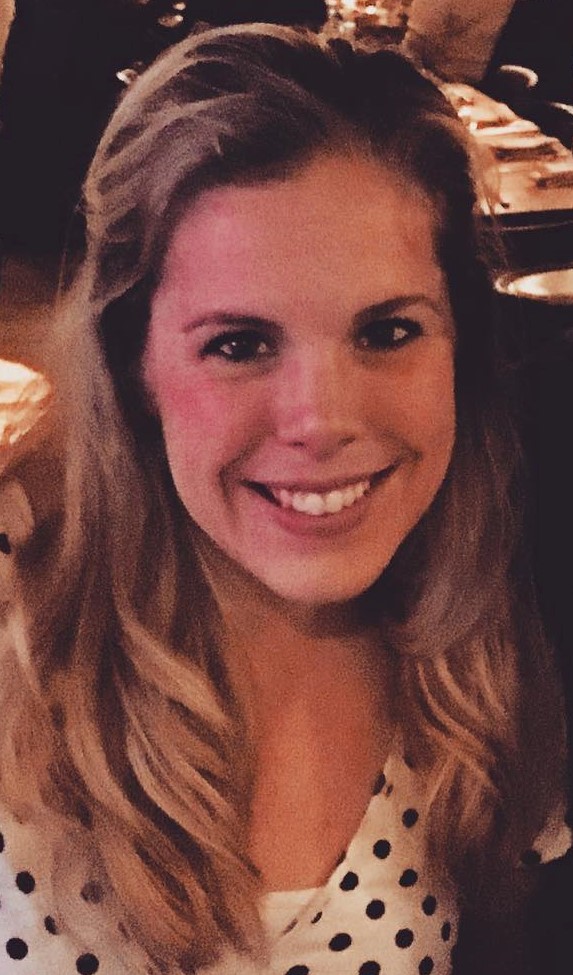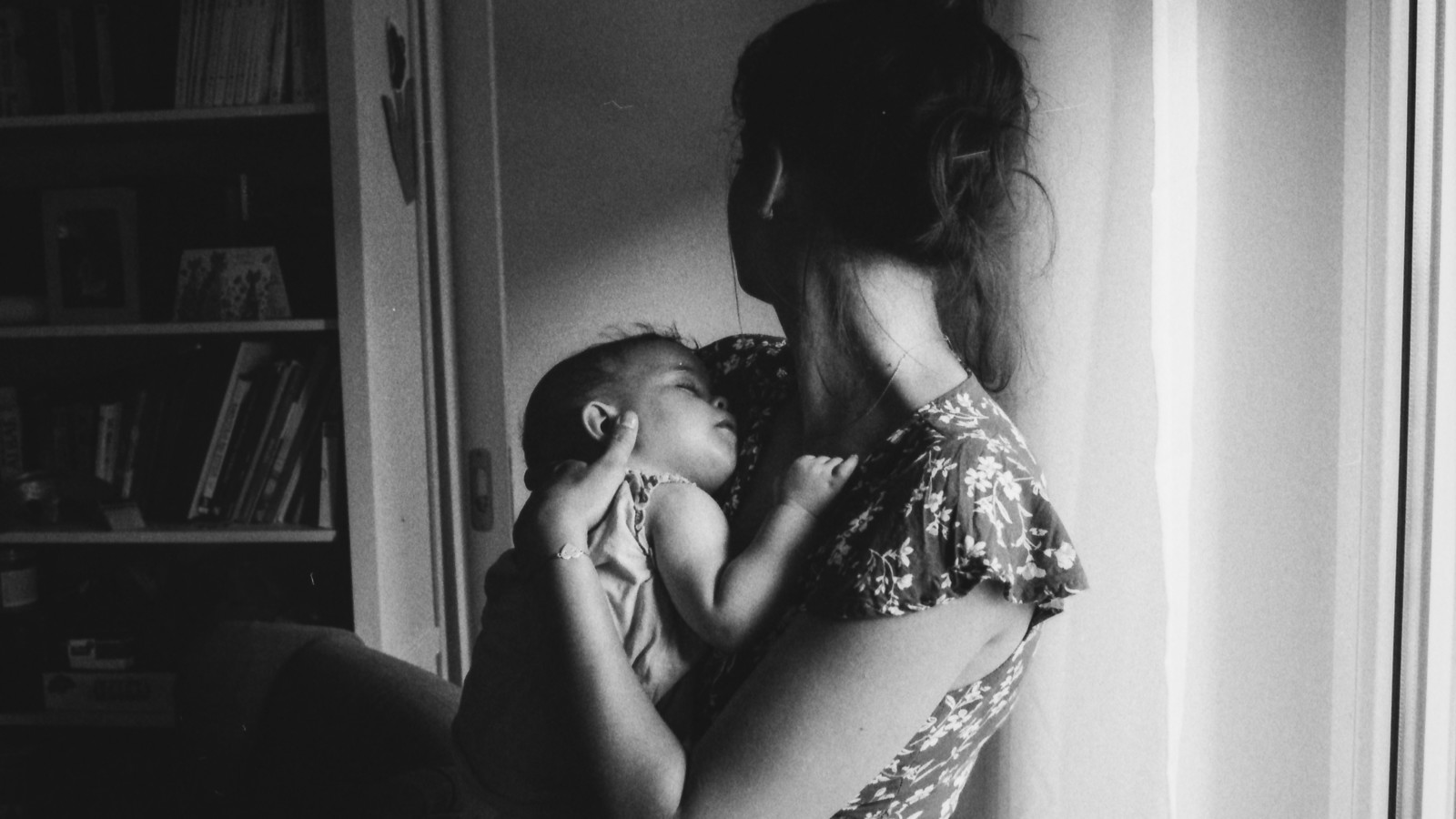Let’s just be real: After having three babies, I probably wouldn’t turn down trading my body for Gisele’s if given the chance. I’m likely in good company, as over 90 percent of women report feeling unhappy with their bodies, although only one percent fit the mold of the “perfect” body type splashed on glossy magazine covers. These pressures are particularly heightened during the postpartum season when the expectations of “bouncing back” often overshadow the sheer miraculous feat of growing and delivering an actual human.
On the other side of the spectrum—and as much as I’m here for positive body image campaigns—overly enthusiastic messages to just adore our bodies regardless of the major changes or even trauma they experienced from pregnancy, delivery, or breastfeeding feels like a forced recipe for disappointment (lookin’ at you, stretch marks.)
Rather than changing our bodies or perspectives to unnaturally meet a certain ideal, holding space for the appreciation of what our bodies do accomplish should far outweigh any number flashing from the scale. Whenever those self-critical, mocking, or negative body image thoughts start twisting through your mind, these shifts can help clear the clouded lens that we too often view ourselves through.
1. Identify the Wildly Unrealistic Pressures Around Us
We live in a world overflowing with Instagram filters, diet culture, and countless headlines bellowing “Body After Baby!” about eight seconds after a celebrity gives birth (Ladies, we’d all be workin’ it too if we had our own personal chef, trainer, nanny, makeup artist, hairdresser, stylist, and airbrusher extraordinaire, amirite?) When we see people like the lovely Kate Middleton gliding out of the hospital in a white (!!!) dress, high heels, and nylons literally hours after delivery, it can make us and our glorious mesh hospital underwear feel woefully inadequate.
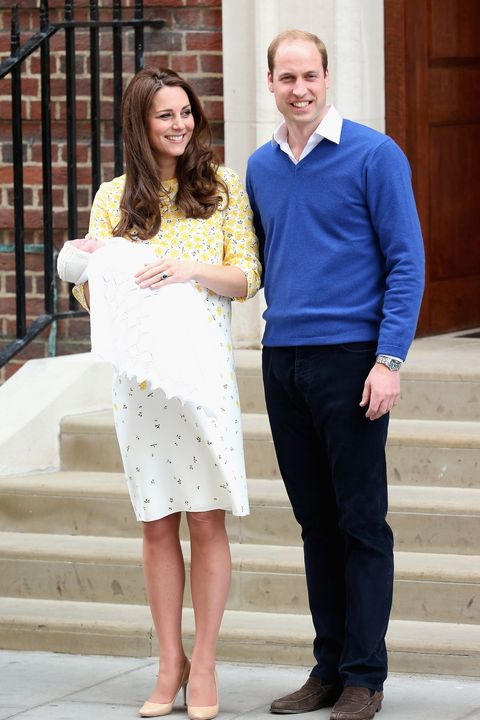
The global beauty industry was worth $532 billion in 2020, according to Forbes. That’s nearly a measly half a trillion dollars in a single year that isn’t achieved if we feel great about ourselves and aren’t motivated to improve our appearance.
New York Times bestselling author Jen Hatmaker highlights what we are up against in her book Fierce, Free, and Full of Fire: “In earlier societies, women had a very small pool…today, the access to high concentrations of narrowly beautiful women creates a false standard. While a person previously might encounter one or two prescriptively gorgeous women in her lifetime, we are inundated with images today suggesting they are ubiquitous. We have the one percent of today’s favorite type in our faces at all times on all platforms. We will likely be unpacking the social media effect on the human psyche for centuries.”
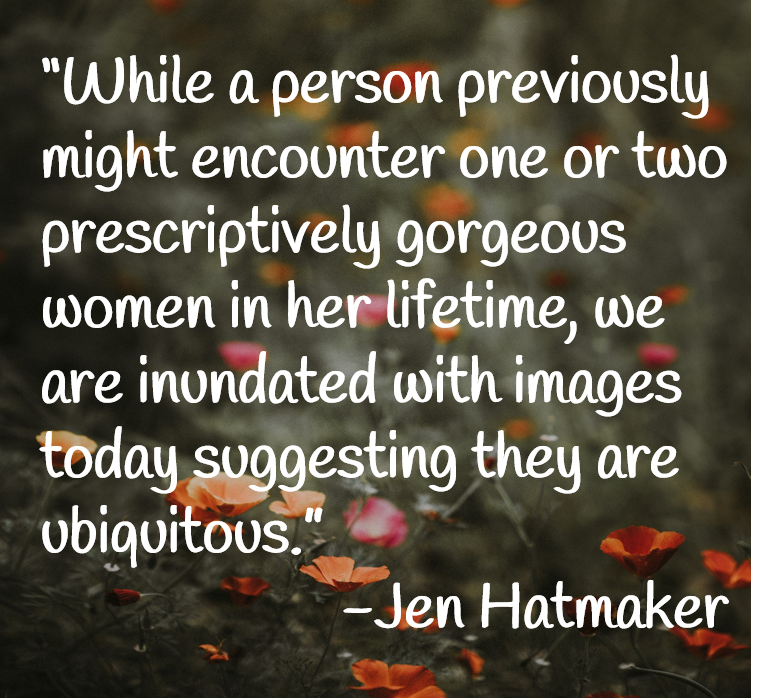
It’s no wonder why millions upon millions of women have negative body image, defined as the way we perceive our physical appearance. The National Eating Disorder Association explains the repercussion of this: “Negative body image (or body dissatisfaction) involves feelings of shame, anxiety, and self-consciousness. People who experience high levels of body dissatisfaction feel their bodies are flawed in comparison to others, and these folks are more likely to suffer from feelings of depression, isolation, low self-esteem, and eating disorders.”
To help combat this issue, Hatmaker outlines the importance of “media literacy,” which is being able to identify that the impossible standards set by the beauty industry are not anywhere close to an accurate representation of real women’s appearances and should never be a level for comparison.
I may never be handpicked to strut down a Victoria’s Secret runway (they can keep the painful-looking diamond-encrusted contraption anyway, I can barely tolerate my Hanes deluxe cotton) but deriving our sense of self-worth from such impossible standards will always be a losing battle. Having compassion for ourselves and moderating our own inner heckler is a critical step in healing a deeply bruised self-image.
2. Repair How We Talk to Ourselves
As much as I respect what body-conscious campaigns cheering “You’re Sexy At Any Size!!” are trying to do, the pressures to fully embrace every aspect of our appearance can come across as an unintended toxic positivity, denying some of the very real and tough things our bodies have endured after bringing babies into the world. But to love ourselves, we don’t have to absolutely adore our residual kangaroo pouches or treasure the wispy flyaways of postpartum hair that stick straight out like I’ve been electrocuted whenever I rock the Mom Bun (can we please have a conversation about postpartum hair loss because What. Is. Happening.)
When we feel like we can’t get that point of totally loving our bodies, we can still treat ourselves with respect. If we would never berate a friend for her thighs, stomach rolls, upper arm circumference, or chest perkiness, why would it be okay to critique our own selves so harshly?
Hillary L. McBride, Ph.D., an author, speaker, and therapist who recovered from a severe eating disorder, describes the impact of reframing your perspective by thinking of your body as a “she” rather than an “it.” She explains, “When we think about our body as a ‘her’ or a ‘she’—this living, breathing being—it sometimes is easier to start to relate in a loving and kind way because we’re borrowing from the way that we relate to others and just applying it to ourselves.”
And while investing in regular exercise, nutrition, and a healthy lifestyle is certainly time well spent, we cross into the dark side if we constantly berate ourselves or over-think about what we should change about our physical appearance to meet an unhealthy goal. Transferring that excess mental consumption over body image into other areas of life can be a complete game-changer.
McBride elaborates, “I think one of my favorite questions to ask people is, ‘What would you have energy for if you spent less time hating your body, manipulating your appearance, focusing on what your body is or isn’t doing and trying to make it different? What would you do with all of your brainpower if you were not obsessing about meal planning and calorie counting and shaming yourself?’ There is a revolution in order here.”
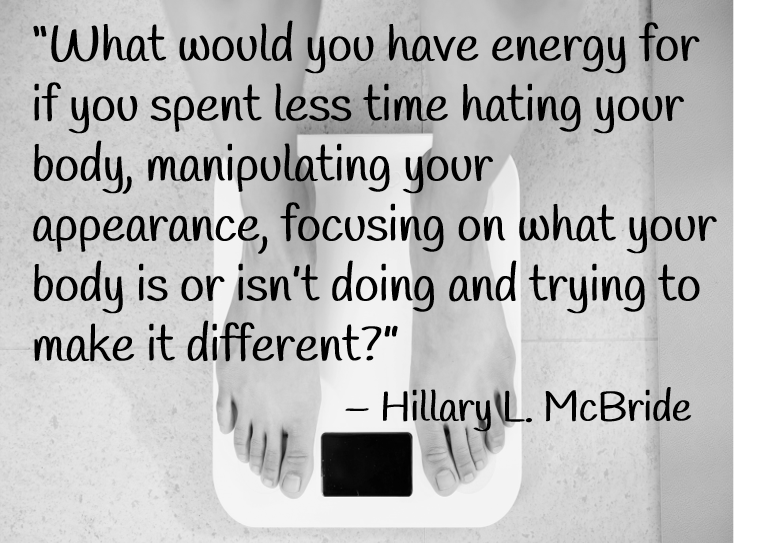
I will probably never fully looooove that my body that is forever marked with the battle scars of pregnancy and childbirth, and that’s okay. But I am damn proud of and will forever be grateful for my body for giving me my kids, who wouldn’t be here without it her. I love the reason behind all those flaws, which is why I feel appreciation, not disappointment, when I look at them.
3. Recognize What Our Bodies Do for Us
Like a pond’s reflection morphed by a Spring rain, my body after growing, delivering, and feeding three babies is an altered version from what I saw before. Shadowy crescents lounge stubbornly under my eyes. A silver ivy of stretch marks meanders around my midsection. Gravity…enough said. Yet viewing our bodies solely through the lens of appearance severely limits our recognition for all of its other incredible abilities. If we are lucky enough, our bodies may be able to:
- Hear our baby’s first cry and laugh, birds chirping after a long winter, or a favorite song with the windows rolled down. (Hello to all my kindred spirits blasting 2000’s hits after dropping their kids off at preschool. “Get Low” indeed.)
- See a rainbow painting the sky, glowing autumn leaves, a stunning sunset, the innocence of a sleeping baby, the assurance of a friend’s face, or our kid’s smile light up our hearts.
- Taste delicious chocolate, the redemption of hot coffee after a sleepless night, a cheesy slice of pizza, or the subtle notes of a glass of wine (or two.)
- Smell the fresh air, a summer rain, our favorite scented candle, or the oddly magical drooly scent of our baby’s cheeks after naptime.
- Feel crisp sheets, a hug when words fail, cozy socks, the softness of our baby’s skin, a spring breeze, or the comfort of a hot shower–minus the Phantom Cries.
- Comfort our kids the way no one else on the planet can: our arms provide infinite hugs, our hands wipe away glistening tears, our feet walk them into their first day of kindergarten, our smiles shower them with reassurance, and our superhero mom-spidey senses can tell something is wrong with just one glance into our child’s eyes or if our kid has a fever by a single touch.
Without my body, which has been loyal and good to me for three and a half decades despite my barrage of constant insults, I would never have experienced the most magnificent aspects that life can offer.
Beautiful You
Although we have grown and changed over the years, this still is the same body that perhaps hopscotched across sidewalks, tentatively got back up with skinned knees after falling from a bike, stumbled through those awkward teenage years, scream/sang at a first concert, danced and drank (water of course) on Spring Breaks, floated down an aisle, or cradled a newborn baby. Blocking out the noisy demands of the world and focusing on what our bodies already accomplish daily opens the door to let gratitude in and shame out. What truly matters is how you feel about yourself, with the appreciation for the beautiful things in life that your body has helped you to experience.

